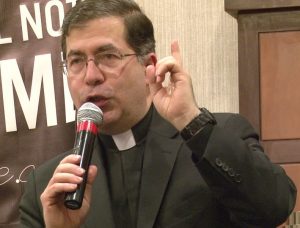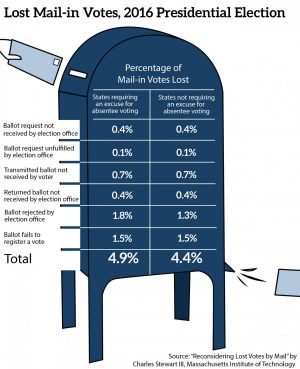Everything That Went Wrong With the First Presidential Debate and How We Can Fix It
NASA:BILL INGALLS AND GAGE SKIDMORE VIA WIKIMEDIA COMMONS
After what was widely regarded as a disastrous debate on Sept. 29, the question arises: How can future debates be improved?
October 7, 2020
The first presidential debate between former Vice President Joe Biden (D) and President Donald Trump (R) for the 2020 election was on Sept. 29. Many viewers, including myself, were hoping that it would contain even moderately substantive discourse about the grave challenges affecting this country. We were sorely mistaken.
As is typical for anything related to this election cycle, the debate was stuffed to the brim with a rancid mix of falsehoods, dog-whistles and ugly personal attacks. The disaster that was the first presidential debate has raised an interesting question: How could presidential debates be improved in the future?
With the amount of problems facing America at the moment, we need more and shorter sections in future presidential debates. Even more pressing is the inherent need to promote facts and the truth during presidential debates.
Chris Wallace, the moderator of the first debate, has been praised in the past for being one of the few non-ideologues remaining on Fox News. Yet even he was completely unable to tamper down such an unruly spectacle, and he failed to hold Trump accountable for his repeated attempts to evade questions.
Clear rules should be set on not talking over another candidate nor personally attacking them. While it would be hopelessly naive to think that Trump would do so, compliance could be nearly guaranteed by using microphones that mute when the voice of another microphone is detected.
The Sept. 29 debate consisted of six topic discussion segments that were supposed to be 15 minutes each: “The Trump and Biden Records,” “The Supreme Court,” “COVID-19,” “The Economy,” “Race and Violence in our Cities” and “The Integrity of the Election.”
Each of these issues are important, despite the inherently problematic framing of referring to protests for social justice as “Race and Violence.” The said questions should not have wording that explicitly or implicitly discriminates against a minority group. Yet these topics were too broad and should have been broken down into multiple shorter and more specific questions.
Even more concerning was the lack of a planned segment on climate change, though the recent wildfire season on the West Coast was eventually brought up late in the debate. This is deeply unfortunate given the undeniable and pressing urgency of the need to immediately address climate change before it is too late.
With the number of problems facing America at the moment, we need more and shorter sections in future presidential debates. Even more pressing is the inherent need to promote facts and the truth during presidential debates. Television networks should also put a bar at the bottom of the screen providing fact checking in real time for false or erroneous information said by candidates during presidential debates. This is especially important because of Trump’s pervasive lying and distortion of the truth. Wallace was unable to accurately fact-check Trump in real time by rebutting his incorrect answers to debate questions; however, Biden tried his best to call out Trump for blatantly lying. The job of calling out false information should not lie only on the shoulders of the other presidential candidate.
While the first presidential debate this year was an unmitigated disaster, unfortunately, it will likely not change anyone’s mind leading into Election Day, given the bitterly polarized nature of the country.
Yet there are still lessons to be learned from this disastrous time in American politics in hopes that future presidential debates will be more informative, thorough and truthful.
Political disagreements will always remain, but the extreme ugliness and callous disregard for basic facts can hopefully end after this debate if more Americans recognize that our democracy is in danger.














